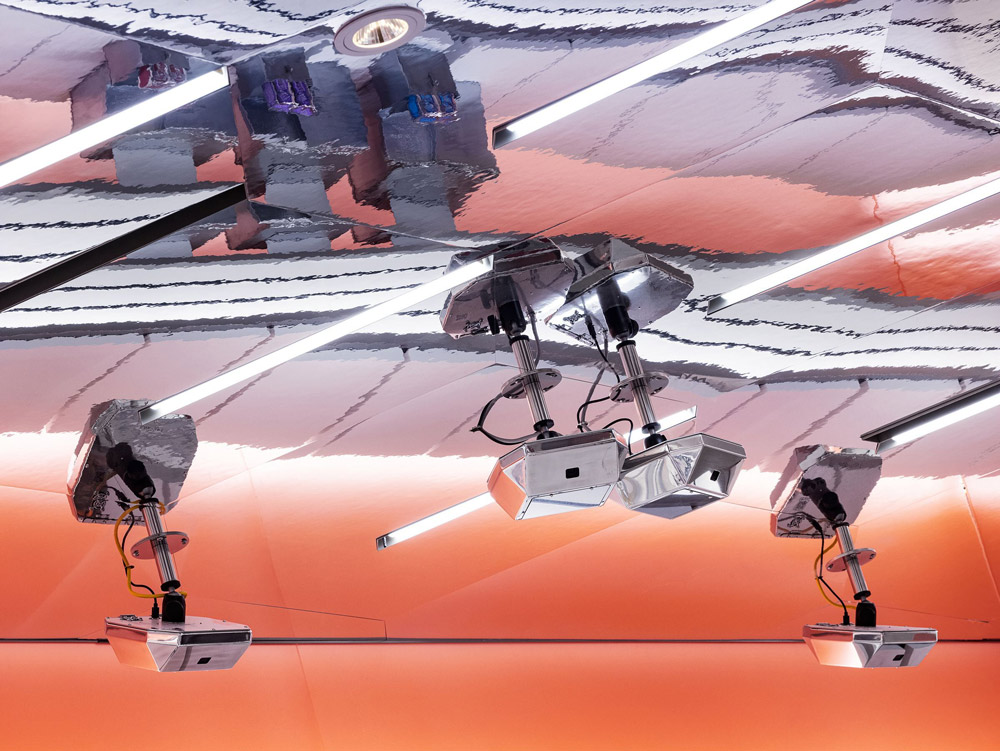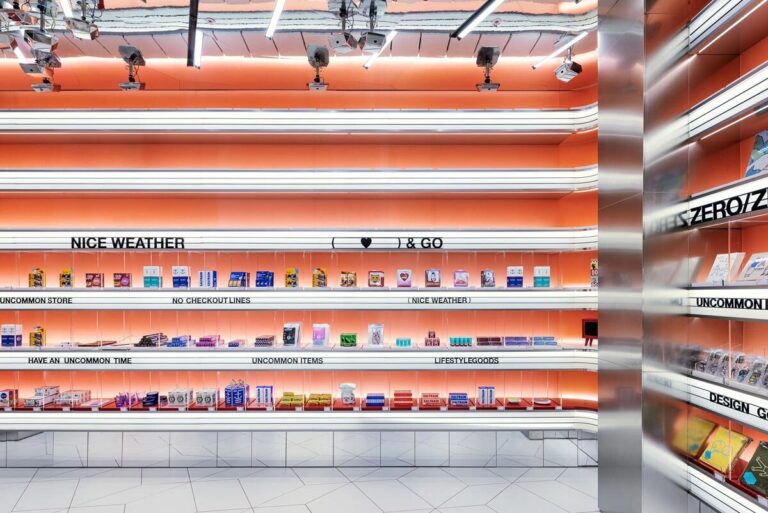Interaction-free shopping is already here. How will it impact both workers and customers?
Pristine aisles of stocked goods galore, shelves lined neatly with not a thing out of place, a hassle-free self-checkout ready to bag up your items—sounds like a dream, doesn’t it? Be gone long queues, sayonara and good riddance the dreaded cash count at the till. The utopia of easy-breezy shopping that is interaction-free comes with a slight catch: there’s no people at all, as in, no workers. The future is certainly bright, but the lights seem to be going out for people manning the tills. And to me, that’s a huge problem—one that cannot be ignored.
Technology is taking over, we’ve figured that out by now, but it seems that it’s also come to take away our store workers. At the risk of sounding too much like a tin foil hat wearer here, this might be the start of a slippery slope to the real life I, Robot. Now, stay with me here, because I think there’s more than a few kernels of truth in the ‘Black Mirror’s newest season is real life’ tweets that swamped Twitter back in 2019. All jokes aside, we need to address the very large, pink elephant in the room—where do all the store workers go if stores don’t need them anymore?
We already know that Amazon jumped at the chance to unveil its new line of Amazon Fresh grocery stores, with a new crop of convenience stores coming to the UK in March of this year. Ushering in the idea, and enticing more companies to follow suit, the tech giant unveiled its prospect of becoming consumers’ new one-stop-shop filled with all your favourite ‘fresh’ produce in 2020. The company, of course, seeks to expand its Midas touch and once again prove to us all that no matter how much the internet bashes Jeff Bezos in favour of Leonardo Dicaprio—who also famously called checkout lines “the worst thing about physical retail” in a 2018 letter to shareholders—it is still a juggernaut.
With Andy Jassy now at its helm, Amazon has released six Amazon Fresh grocery shops in London to date—with it only set to spawn more, Evening Standard reported. The stores operate on technology monitoring your every move “to determine what you’re actually buying,” according to MakeUseOf, and provide a fast and futuristic experience.
The big daddy of capitalist corporations also has plans for widening its net of physical real estate within the UK. The company announced earlier this week that it will open another store in White City’s Westfield shopping centre, West London, which will focus on selling a wide range of the best-rated products from its website. The cost of Amazon’s exponential growth, which only seems to skyrocket some more every day, is unfortunately paid by its workers who sadly don’t see nearly a fraction of the big bucks their boss does.
Outside of being a powerhouse of soft power, the tech-advanced South Korea has already latched onto the concept. Outlets like Input and Superfuture have already documented how the cashierless shop boom of Japan has spread to Seoul in the form of the Uncommon Store. Living up to its name, this ‘sexy’ new app-associated store is based in the Hyundai Seoul shopping complex—a department store that spans 959,000 square feet, and hosts over 600 brands including the likes of Prada and Balenciaga.

To keep it simple, it’s Amazon Go only way better—even though it was apparently designed in collaboration with the company. Dreamed up by Hyundai IT&E, the Hyundai Department Store group (unaffiliated with the car brand) is the mastermind behind this silver coloured, 355 square foot peachy dream. With the store’s exteriors wrapped in neon winding bands reminiscent of straps commonly used for theatres during the 1960s. Inside, neon bands line the tiered shelving and illuminate the shop in a soft light, making its lack of humans somehow less noticeable.
The Uncommon Store is definitely uncommon in its design, with “a cloud system and internet hyper connections (ICT) AI complex sensors, and machine learning techniques,” as stated by Superfuture. Aesthetically, it has the same traits as a “cosmetics outlet at a department-store or an airport,” The Cool Hunter noted. The company wanted the store to appeal to young Koreans who are more than used to digital shopping experiences. Going for a retro futurism look, the local architecture firm behind the design, Atelier Archi@Mosphere, told Archello that it was supposed to capture “the essence of technological innovations and their integration with space.” Glossy laminated surfaces cover the patterned ceiling and contrast with industrialised materials such as metal, acrylic, giving a futuristic flair to the retro establishment.
@jesseogn Would this system work in your country? (lb: @leanneinjapan) #japan #japanese #japantravel #japanlife
♬ アスノヨゾラ哨戒班 - 翡翠≠ぽんはち🐤
It seems like Korea is beginning to rival its neighbouring country Japan—housing the second largest retail market in the world, according to Forbes—for its status as a leading shopping destination. The Uncommon Store perfectly targets millennial and gen Z shoppers, two demographics believed to be the cause for the frantic reformation of consumer behaviour and retail tactics to capitalise on them in recent years. Shoppers can buy all their usual produce as well as soft drinks and snacks, provided for by trendy local convenience chain Nice Weather.
Before entering, shoppers are required to install an app by scanning a QR code indicated on a board next to the entrance. After registration and login, payments are automatically processed, so that no cash or bank card is required. But the push for more sleek, streamlined stores is troubling when you actually think about it. While it is fascinating to see how great these stores can function, there’s a tiny dotted fine print most of us seem to overlook when agreeing to this type of future—saying goodbye to human workers. Though reducing “overhead from paying employees” as Input have suggested, will obviously get a thumbs up from money-hungry conglomerates like Amazon, should all big businesses on the high street do the same?
Grocery shopping is going ghost, as is retail, and outlets like TechHQ have stated it is actually a natural part of living within a post-pandemic world. On the surface, it seems to be a natural move towards a better and brighter future—with commissioned studies like one carried out by Forrester Research and Digimarc showing that the experience at the checkout is essential to shoppers. With the average shopper privy to a range of tech options that make shopping easier, and with Apple Pay and contactless now being the norm, the feeling of the time wasted waiting represents an important drawback on someone’s weekly shop.
Like our online habits, courtesy of overconsumption culture, consumers seek quick and convenient experiences when shopping in real life too. Net Solutions reported that the world of retail and consumer shopping is a landmine of anger for a lot of people. An Omnico US Retail Research report also looked at the “shopping pain points” of 2,008 consumers across the US and their attitudes towards technology—almost 74 per cent of respondents said technology will make it easier to shop. The customer is always right, and they seem to be bang on the money too, as 86 per cent of people want to use scan and checkout apps for cell phones or tablets to skip lines and save time. Last but not least, as if you needed more convincing still, 82 per cent of respondents were willing to use kiosks to make in-store payments faster and easier.
@rachelheheh #korea #seoul #koreatravel #koreatravelguide
♬ Spongebob Closing Theme Song Music - Ocean Floor Orchestra
In the meantime, TikTok has allowed the rest of us to step into the future, with thousands of videos celebrating some of the innovations snazzy stores in both Japan and Korea have to offer. But among the starry-eyed praise, the prospect of ‘robot operated stores coming near you’ doesn’t seem to be questioned for the reasons you’d think.
@rachelheheh Social interaction? No thank u 😘🙏 #korea #seoul #fyp #foryou
♬ Blue Blood - Heinz Kiessling
Creator @rachelheheh posted a video captioned “Social interaction? No thank u 😘🙏.” On TikTok, Rachel documents what it’s like inside a Korean convenience store with no workers. The most popular comment on the video—with over 100,000 likes—said, “Try this in America. The whole store empty in 2 hrs.” Surprisingly, the lack of people to interact with wasn’t a concern for commenters. In her video, Rachel also lists the pros of shops like this, stating that there is “less physical contact 😷” and that it saves time and money to shop at such futuristic options. And yet, not only are these stores alienating consumers who aren’t so tech-savvy, but also the workers whose livelihoods depend on them.
Another video posted by @snfad_diela also gives the rest of us an inside glimpse of Korean cashierless shopping, with no comments voicing concerns over this soon-to-come dystopian nightmare. It seems as if many are swept away by the soft serve ice cream dessert shops and blinded by the glamorous aesthetic of these stores. The sad reality is, in an effort to cut costs and hike up profits, the era of cashiered tills will simultaneously cease to exist. Get ready to chat up your local Tesco’s workers pronto, because they won’t be there forever.





